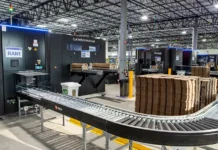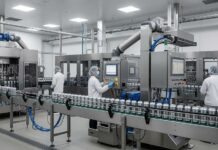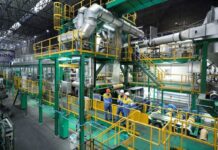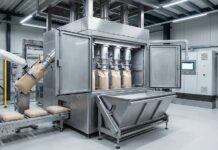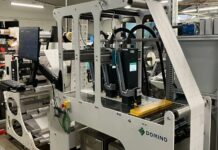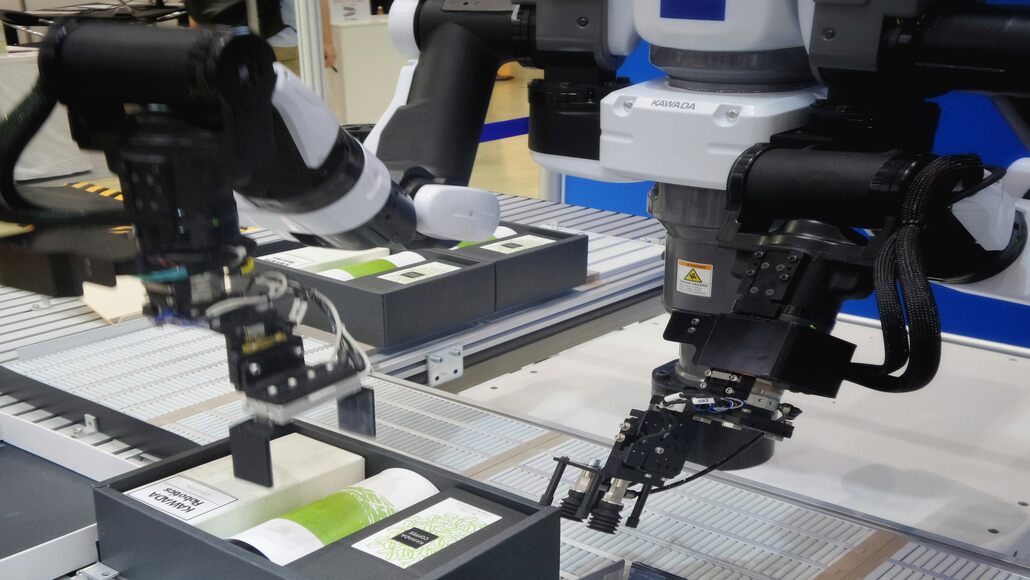How Smart Automation is Transforming Packaging Efficiency?
The pursuit of higher packaging efficiency stands as an essential objective for both packaging and supply chain management sectors. Current operational improvements depend primarily on advanced automation systems and technological innovations like artificial intelligence (AI). Emerging technologies transform business workflows to enhance performance and manage labor shortages while minimizing downtime. Business organizations which adopt smart automation establish a competitive edge through their ability to streamline production processes while reducing errors and improving scalability. Smart automation enables companies to adhere to industry standards and regulatory necessities which assists them in meeting strict quality and safety standards.
The Role of Smart Automation in Modern Packaging
Smart automation functions as an essential tool to decrease inefficiencies found in packaging lines. Smart automation serves to decrease changeover durations while managing variable consumer needs and removing repetitive manual operations. Technological advancements are broadening automation capabilities because essential components such as servos, sensors, robotics, and camera systems become more affordable and accessible. The continuous increase in labor expenses makes the incorporation of smart automation into packaging operations more feasible. Enhanced workplace safety boosts packaging efficiency by reducing worker exposure to dangerous tasks which results in fewer accidents and better operational reliability. Businesses that use smart automation solutions have superior capabilities to expand their operations smoothly which enables fast business expansion.
AI’s Expanding Influence on Packaging Efficiency
Machine learning, deep learning and natural language processing enable AI solutions to progressively automate packaging workflows. Real-time and historical data analysis through these technologies helps reveal production inefficiencies while improving quality control measures and refining production strategies. Through the use of machine learning algorithms businesses can foresee trends and prevent errors from worsening while optimizing packaging processes based on data analysis. AI provides dynamic decision-making capabilities that enable smart automation systems to adapt automatically based on incoming data which maintains consistent product quality and reduces waste. AI-powered robotics increase packaging efficiency by accomplishing precise and rapid operations beyond human capabilities.
Enhancing Process Automation with AI and Data Analytics
Smart automation systems become more efficient through AI integration which simplifies complex workflows while boosting equipment performance. Through AI implementation businesses experience reduced downtime together with enhanced production precision and reduced operational expenses. Sustainable production targets become achievable through AI-driven insights which reduce waste and improve both material usage and energy efficiency. These systems develop knowledge over time which enables manufacturers to make smarter decisions based on data analysis leading to increased packaging efficiency. The early detection of inefficiencies through AI-powered analytics enables manufacturers to implement timely interventions that prevent expensive production delays. The integration of AI enables manufacturers to drive innovation through predictive analytics and scenario planning which helps them foresee market demands and make strategic production adjustments.
Predictive Maintenance and AI-Driven Optimization
Predictive maintenance represents one of the most powerful applications of AI in improving packaging efficiency. AI-enabled systems identify equipment failure risks before they occur which helps to decrease unplanned stoppages and maintenance expenses. Manufacturers who use real-time analytics can establish preventive measures to prolong machinery lifespan while improving production reliability. AI-driven automated diagnostics assists maintenance personnel in identifying failure causes promptly and efficiently planning repairs to boost operational lifespan. Preemptively fixing equipment problems results in less material wastage while improving packaging processes which in turn leads to superior product quality.
Maximizing Packaging Efficiency in the Supply Chain with AI
Supply chain management benefits from AI technologies that boost packaging efficiency through improved demand forecasting as well as optimized inventory and logistics management. Key applications include:
- Yield Optimization: AI examines sales patterns along with inventory and market information to optimize production planning while reducing waste generation.
- Supply Chain Coordination: AI insights improve material sourcing efficiency while minimizing overstock and enabling just-in-time inventory management.
- Production Planning & Scheduling: Manufacturers can dynamically adapt production schedules through real-time data management which removes constraints and optimizes resource usage.
- Quality Control & Inspection: Machine vision systems powered by artificial intelligence precisely detect defects which results in fewer product recalls while maintaining quality standards compliance.
- Personalization & Customization: Artificial Intelligence enables brands to tailor packaging designs to consumer tastes which leads to increased customer interaction.
- Logistics Optimization: AI systems forecast supply chain disruptions which enables businesses to address risks before production suffers any effects.
- Automated Supplier Management: Through monitoring supplier performance and refining procurement strategies AI systems ensure that material sourcing remains both cost-effective and reliable.
- Smart Warehouse Management: Through automation of sorting tasks and shipment monitoring AI ensures smooth movement of inventory while managing warehouse packaging operations.
Overcoming AI Implementation Challenges in Packaging Automation
Although AI systems offer significant advantages, they also create multiple challenges when integrated into packaging efficiency processes. The generation of massive data volumes from connected systems demands both strong infrastructure and advanced analytics capabilities. The implementation of AI technologies requires professionals with specialized skills to build and sustain these systems. To maximize smart automation efficiencies companies, need to either train their existing workforce in new skills or hire experts specialized in AI. AI integration brings security challenges for companies which need to protect data while preventing cyber threats and following industry standards. Businesses need to integrate AI smoothly into current processes to avoid operational interruptions and achieve maximum investment returns.
Improving Packaging Efficiency with Traceability
Modern smart automation relies heavily on traceability because of rising consumer needs for diverse products and direct deliveries. Production, inventory and logistics operations gain real-time visibility through AI-driven tracking systems. This transparency enables:
- Faster order fulfillment
- Proactive inventory replenishment
- Automated reordering processes
- Industries like food processing and pharmaceutical companies must adhere to regulatory compliance standards.
Through the use of AI-powered barcode and scanning technologies businesses achieve heightened consumer engagement by delivering product details and assisting environmental efforts while making recycling easier. The fusion of blockchain technology and AI creates enhanced traceability capabilities because it securely documents transactions and product paths while delivering unmatched precision in tracking and verification. Organizations that implement smart automation traceability systems improve risk management capabilities while maintaining regulatory compliance and building stronger consumer trust.
The Impact of AI and Smart Automation on Sustainable Packaging
AI serves as a vital tool to create sustainable packaging solutions because efficiency in packaging is becoming increasingly important. Smart automation achieves material waste reduction through optimized packaging design and minimized material use. The use of AI in production planning improves energy usage which leads to a decrease in the carbon footprint during manufacturing. Automated systems now commonly incorporate smart automation solutions that use biodegradable materials and recyclable components to adhere to environmental laws while sustaining efficient operations. AI contributes to creating innovative packaging materials that are environmentally friendly through simulation of ecological effects and testing various solutions.
Building a Future-Ready Packaging Industry with Smart Automation
The adoption of smart automation paired with AI-driven systems creates a path toward a packaging industry that achieves high efficiency and sustainability while remaining cost-effective. Organizations that adopt smart automation technologies gain market advantages by enhancing production precision while optimizing resource deployment and minimizing operational expenses. Manufacturers who adopt automation and AI technologies increase their productivity while building robust supply chains and safeguarding their operations for the future. The widespread implementation of cloud computing and IoT (Internet of Things) technologies in the packaging efficiency sector provides seamless connectivity and improves operational insights necessary for decision-making. Businesses which actively embrace smart automation solutions will benefit from enhanced operational performance while establishing leadership in the dynamic field of packaging efficiency.






